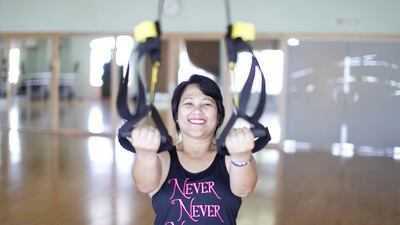Elaine Coronel shares her experience and says that in the UAE women are now abandoning cultural taboos that surround health and speaking about their symptoms.
SHARJAH // Elaine Coronel knows that it is never too early to begin self-examination for breast cancer.
The fitness manager at Sharjah Ladies Club learnt last year that she had breast cancer.
The 38-year-old routinely trains eight hours a week and teaches group fitness classes.
Breast cancer is the most common cancer affecting women worldwide, accounting for 16 per cent of all cases, but the condition is treatable and curable if detected in its earliest stages, for which the five-year survival rate is 98 per cent.
Ms Coronel has been in the UAE since 2001, beginning her life in the Emirates in Dubai before moving to Sharjah in 2007.
After the Filipina’s diagnosis in March last year and recovery, she was given the all-clear last November and has since become a role model for many women.
“At the club, we are still 95 per cent Arab and, in that culture, it is still taboo to say they are feeling ill, but now they are coming to me and telling me they are feeling certain things, that they have found a lump,” Ms Coronel says.
“Now, I offer to go with them to checks, to consultations, just to give them support.”
She also gives motivational talks to women around the UAE to raise awareness of breast cancer.
Ms Coronel had a single mastectomy and four months of chemotherapy.
“I would really encourage women to have early tests,” she says. “My mum had this when she was 60, so I had no excuse not to be checking.”
However, she said her checking had not been so frequent in recent years.
“I had three years where I wasn’t checking so much so the lump became cancerous, so if I had been more vigilant in those three years, I could have caught it.”
According to a 2010 report by the Centre for Arab Genomic Studies, Arab women are more likely to develop breast cancer at an earlier age than women from other groups.
Research at the Weill Cornell Medical College in Qatar last year supported the findings and said the disease appears in Arab women, on average, 10 years earlier than among women in Europe.
Ms Coronel said many have been surprised that a woman of her activity levels could be caught by cancer.
“I had one client who said that she would stop exercising as, if I could get this, what was the point? But I explained that being fit and strong helps us fight these things better and recover faster,” she says.
“With my background, it shows anyone is at risk. Nobody can be complacent. Seeing me helps people realise this. It’s not just about being fit and healthy.
“I can show that I am weak as well. I’m human but it’s a matter of how you pick yourself up. You can’t always project that you’re strong.”
While going through chemotherapy, she continued to inspire women, participating in the Burjuman walk and the five-kilometre Colour Run, complete with head scarf over her bald head and surgical mask around her face to protect her from fumes while vulnerable during the treatment.
“Being diagnosed with cancer for me isn’t the end of everything. It shouldn’t stop you living or breathing. You have a choice: to feel sorry for yourself or to live, and I chose to live,” she says.
But it is the next chapter that Ms Coronel says is most important. In addition to being back to teaching now, she is in training to travel to Australia in April with her team, the Dubai Dragon Warriors, to compete in the dragon boat racing world championships.
“What you do after is the most important thing,” she says. “It should make you value life. I still don’t feel back to normal, as fit or strong as I was, but it’s a process.”
mswan@thenational.ae

